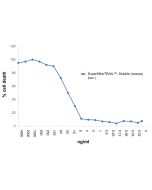Cookie Policy: This site uses cookies to improve your experience. You can find out more about our use of cookies in our Privacy Policy. By continuing to browse this site you agree to our use of cookies.
AdipoGen Life Sciences
anti-TRAIL (human), mAb (HS501)

| Product Details | |
|---|---|
| Synonyms | Apo-2L; TNFSF10; CD253 |
| Product Type | Monoclonal Antibody |
| Properties | |
| Clone | HS501 |
| Isotype | Mouse IgG1 |
| Source/Host | Purified from concentrated hybridoma tissue culture supernatant. |
| Immunogen/Antigen | Recombinant human TRAIL. |
| Application |
Western Blot: (1:1000) |
| Crossreactivity | Human |
| Specificity |
Recognizes human TRAIL. |
| Purity | ≥95% (SDS-PAGE) |
| Purity Detail | Protein G-affinity purified. |
| Concentration | 1 mg/ml |
| Formulation | Liquid. In PBS containing 10% glycerol and 0.02% sodium azide. |
| Isotype Negative Control | |
| Shipping and Handling | |
| Shipping | BLUE ICE |
| Short Term Storage | +4°C |
| Long Term Storage | -20°C |
| Handling Advice |
After opening, prepare aliquots and store at -20°C. Avoid freeze/thaw cycles. |
| Use/Stability | Stable for at least 1 year after receipt when stored at -20°C. |
| Documents | |
| MSDS |
 Download PDF Download PDF |
| Product Specification Sheet | |
| Datasheet |
 Download PDF Download PDF |
TNF-related apoptosis-inducing ligand (TRAIL; Apo2L;CD253; TNFSF10) is a type II transmembrane protein of about 34kDa. Like most members of the tumor necrosis factor (TNF) superfamily of cytokines TRAIL can be cleaved at the cell surface by metalloproteases to form a soluble molecule. Active TRAIL forms trimers and specifically binds to five distinct receptors: TRAIL-R1 (DR4; Apo2; CD261; TNFRSF10A), TRAIL-R2 (DR5; KILLER; TRICK2A; TRICK2B; CD262; TNFRSF10B), TRAIL-R3 (DcR1; LIT; TRID; CD263; TNFRSF10C), TRAIL-R4 (DcR2; TRUNDD; CD264; TNFRSF10D), and osteoprotegerin (OPG; OCIF; TNFRSF11B). Trimerized TRAIL triggers apoptosis upon ligation of cell surface TRAIL-R1 and/or TRAIL-R2 by inducing the formation of the so-called multiprotein death-inducing signaling complex (DISC).
.
- TNF-Related Apoptosis-Inducing Ligand Mediates Tumoricidal Activity of Human Monocytes Stimulated by Newcastle Disease Virus: B. Washburn, et al.; J. Immunol. 170, 1814 (2003)
- Human Colorectal Cancer Cells Induce T-Cell Death Through Release of Proapoptotic Microvesicles: Role in Immune Escape: V. Huber, et al.; Gastroenterology 128, 1796 (2005)
- Specific resistance upon lentiviral TRAIL transfer by intracellular retention of TRAIL receptors: T. Wenger, et al.; Cell Death Differ. 13, 1740 (2006)
- Growth inhibition of colorectal carcinoma by lentiviral TRAIL-transgenic human mesenchymal stem cells requires their substantial intratumoral presence: J. Luetzkendorf, et al.; J. Cell. Mol. Med. 14, 2292 (2010)







